Martin Keown was wearing his brand new black leather jacket to the training ground. That was his first mistake.
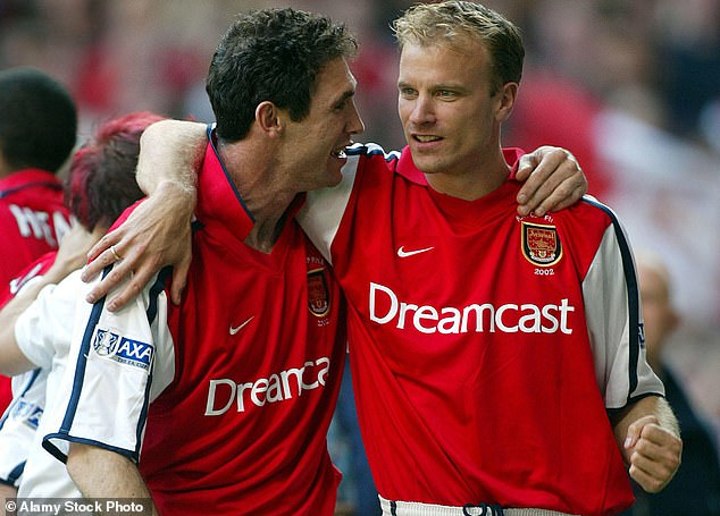
His second was leaving it alone in the dressing room with Dennis Bergkamp and Ian Wright, Arsenal’s resident pranksters. Usually, whoever was deemed the worst-dressed player by the duo would be punished by returning to find his clothes hanging from the ceiling.
‘I used to have to get Sean O’Connor, the ground manager and a good guy, out with his ladder to get my gear back,’ says Keown.
But Bergkamp had another idea this time. He got the gaffer tape and turned his team-mate into the newest member of the T-Birds.
‘Martin, you must realise you cannot turn up wearing a black leather jacket,’ explains Bergkamp, speaking to Sportsmail from his elegant home in Holland.
‘He looked like John Travolta from Grease. You cannot do that.’ So Bergkamp still believes his team-mate brought it on himself, along with the time Wright saturated his clothes. ‘Wrighty came to give me a hug,’ Keown remembers.
‘I’m hugging him and I’m thinking: “This jumper looks familiar.” Then I think the same about the trousers and shoes. Then he starts running towards the swimming pool.’
Bergkamp, laughing, says: ‘When you’ve got a good team, success will come. And when you have success, you have a lot of fun. It was a great time.’
We are on Zoom to discuss the approaching 25-year anniversary of Bergkamp signing for Arsenal for £7.5million. ‘I didn’t realise,’ he says, and suddenly the Non-Flying Dutchman is considering how time flies.
Over the course of an hour and a half, Bergkamp discusses the good days, old days and what lies ahead for both himself and Mikel Arteta’s Arsenal. Sportsmail’s Kieran Gill joined the conversation.
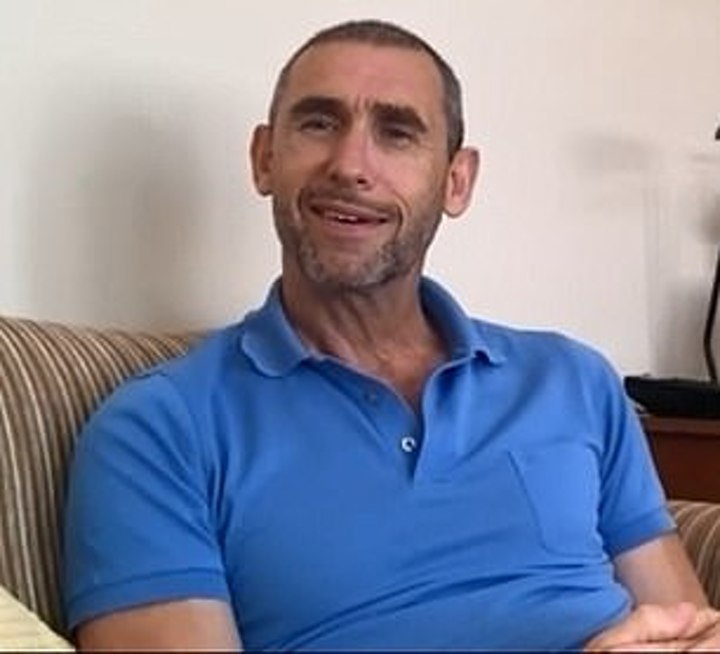
Bergkamp can still recall every detail of his first day at Arsenal. Seeing the marble halls. Sitting to the left of manager Bruce Rioch at his unveiling while a highlights reel plays on a projection screen.
He even remembers the video’s background music – This Is The One by The Stone Roses. Then he was introduced to Highbury’s pristine pitch, a stage where he would become a symbol of elegance. Except there was one problem.
BERGKAMP: There was a small wooden plank laid out because the groundsman told us we weren’t allowed on the grass.
KEOWN: That was Steve Braddock. ‘You might be Dennis Bergkamp but you ain’t allowed on my pitch until Saturday!’ He was a perfectionist, Dennis, much like yourself.
BERGKAMP: I laughed about it. Here was a really passionate guy who wanted to do well. He won a few awards for that pitch, so we can’t blame him.
GILL: You were brought up on Total Football. Did you know about the old ‘boring, boring Arsenal’ jibes before you joined from Inter Milan?
BERGKAMP: No! I decided to leave Inter because they did not live up to the promises they’d made. There were many options but I wanted to come to England. We used to come on holiday here. I spoke to David Dein and Bruce over the phone.
Bergkamp can still recall every detail of his first day at Arsenal. Seeing the marble halls. Sitting to the left of manager Bruce Rioch at his unveiling while a highlights reel plays on a projection screen.
He even remembers the video’s background music – This Is The One by The Stone Roses. Then he was introduced to Highbury’s pristine pitch, a stage where he would become a symbol of elegance. Except there was one problem.
BERGKAMP: There was a small wooden plank laid out because the groundsman told us we weren’t allowed on the grass.
KEOWN: That was Steve Braddock. ‘You might be Dennis Bergkamp but you ain’t allowed on my pitch until Saturday!’ He was a perfectionist, Dennis, much like yourself.
BERGKAMP: I laughed about it. Here was a really passionate guy who wanted to do well. He won a few awards for that pitch, so we can’t blame him.
GILL: You were brought up on Total Football. Did you know about the old ‘boring, boring Arsenal’ jibes before you joined from Inter Milan?
BERGKAMP: No! I decided to leave Inter because they did not live up to the promises they’d made. There were many options but I wanted to come to England. We used to come on holiday here. I spoke to David Dein and Bruce over the phone.
The story from Arsenal was good. A solid team, in London, with players who were not too young or old. I felt we could build something, and straightaway it felt like home. But 25 years? I didn’t realise.
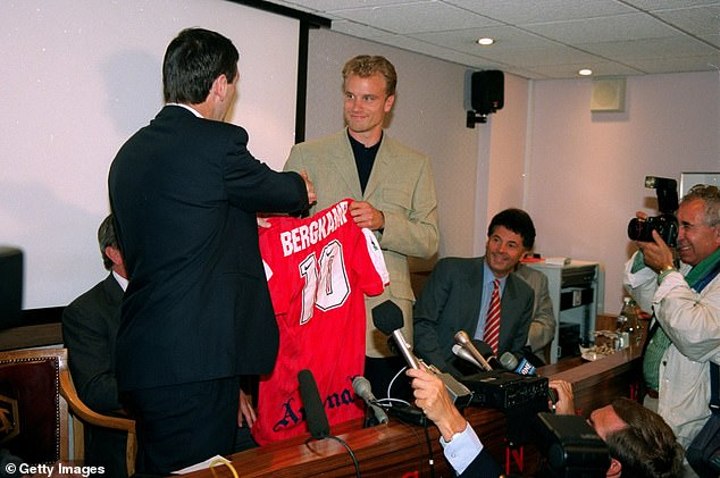
KEOWN: We had our canteen but you used to go home for your dinner at first.
BERGKAMP: It wasn’t food for football players. It was all greasy and fat.
KEOWN: You showed us, even before Arsene Wenger changed our diets, there was another way.
BERGKAMP: Wenger changed it. Sometimes it was a little over the top because when we were in a hotel, the whole mini bar would be empty. OK, take the alcohol out, but keep a Pepsi or Coca Cola in there for the boys! He changed it completely but it wasn’t something from him – it was something European.
I came from Holland and Italy and we used to do it there, using dieticians. It must have been a shock for the English players. I remember my first pre-season, in Sweden. Of course I didn’t fly with the team. I went there with the family, my wife, Henrita.
We had a game then the next day we had two training sessions. In the evening, me and my wife went for a walk, and here are all these English players outside of a pub with massive beers! But the next day, you couldn’t tell in training. They were really going for it. Then in the evening, they did it all again!
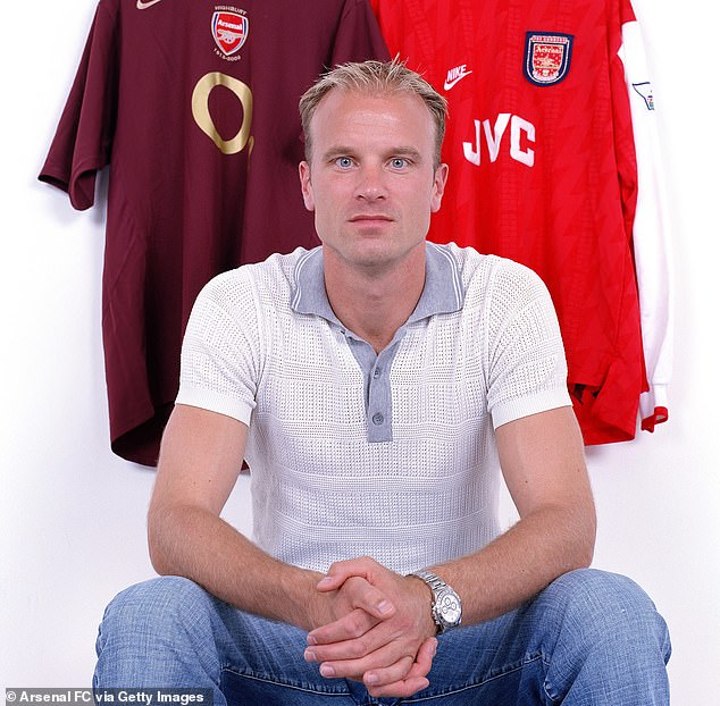
Bergkamp’s father, Wim, named his son after Denis Law. A picture of the Manchester United player even hung on the wall above his crib in their Amsterdam flat. The youngest of four boys, he loved a street kickabout. It was there, against a brick wall, where he mastered the art of the first touch and studied the way the ball would spin back towards him.
KEOWN: I was the same, Dennis. I’ve even got a framed picture of me in front of the wall here.
BERGKAMP: Like a little Diego Maradona!
KEOWN: That wall was my best friend because it always gave me the ball back.
BERGKAMP: That’s our generation. This was a discussion we had with the youth at Ajax. I thought they should train more because they miss all those hours. They’ve got their PlayStations, TVs, mobile phones. They don’t go out. They’re missing out on around 10,000 hours of practice.
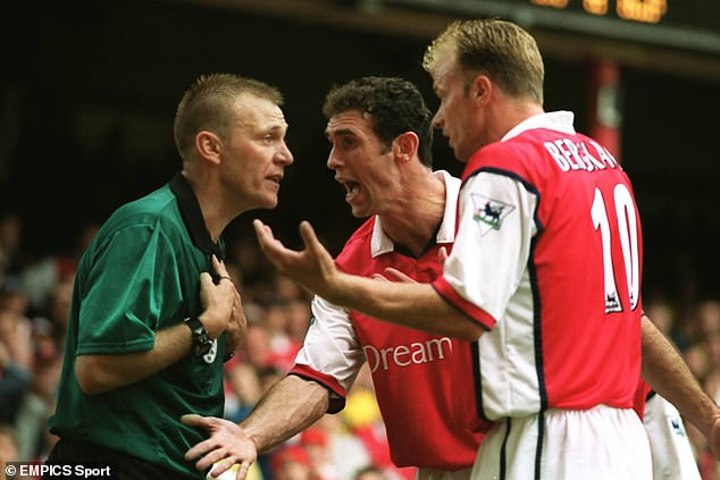
KEOWN: You walked into Arsenal with this incredible artistry, and Wenger had this incredible vision for the future. How did you get on with him at the start? I remember we were each called in for a 15-minute meeting with him. He put a list up on the board and started with the oldest, Andy Linighan.
BERGKAMP: The only thing on my mind was the promises Arsenal had made. We had one season with Bruce and it wasn’t bad. We got into Europe. Then we had pre-season in Scotland and he was sacked. As soon as Arsene came in, we sat down and talked. His philosophy about football is the one I have – attacking football, possession of the ball, creative up front.
KEOWN: I remember the mannequins coming out on the training pitch under Wenger and we’d never seen a mannequin. We were like: ‘What the f*** is this?’ But you’d practise this movement. You would step towards the ball then spin off behind the mannequin. One game at Highbury, I had the ball and wasn’t sure what to do with it, but I saw you make this movement. I played it, and it came off. We scored.
A recent Match of the Day saw pundits Alan Shearer and Wright asked to name the 10 greatest goals in Premier League history. Both selected Bergkamp scoring against Newcastle United as their No 1.
You know the one – the flick, the defender turned inside out and the finish. ‘People talk about whether he did it on purpose,’ says Wright, sat in front of a framed picture of him and Bergkamp hugging the day Arsenal won the title at Highbury in 1998. ‘Of course he did.’
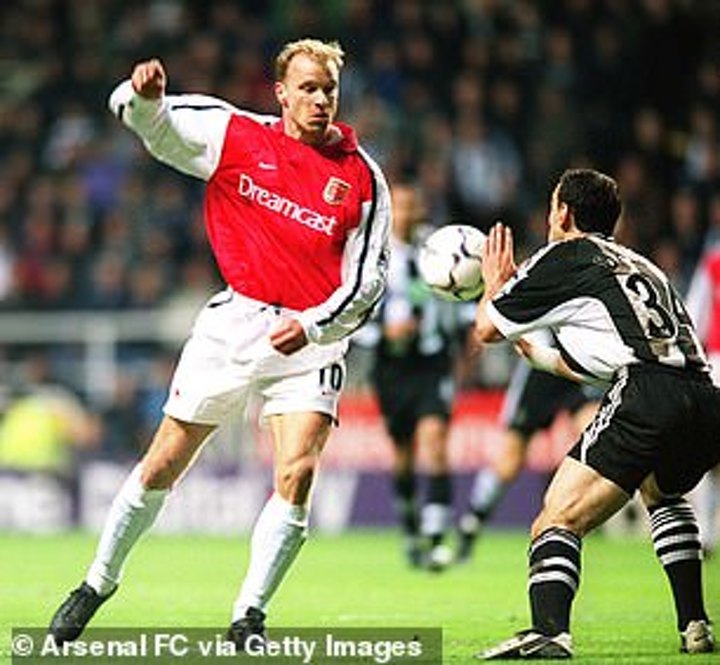
BERGKAMP: I got texts after that game. ‘Did you mean it?’ In my head, there was no question. It was a sequence of little movements which started with a pass (from Robert Pires) that came behind me. You can’t call it luck.
It’s adjusting yourself to what’s happening with the ball, with the defender, with the goalkeeper. Then it looked like that. I was happy with it!
GILL: Was that the favourite goal of your career?
BERGKAMP: Argentina (in the 1998 World Cup quarter-final) was more special for me. It’s the experience of so many hours of controlling balls, finishing, footwork, balance.
KEOWN: That was special. You control a 60-yard ball with one touch, lose your defender with the second, then score with the outside of your right foot. You could always take the ball whichever way you wanted. It was as if you had hooks on the end of your feet!
BERGKAMP: I got texts after that game. ‘Did you mean it?’ In my head, there was no question. It was a sequence of little movements which started with a pass (from Robert Pires) that came behind me. You can’t call it luck.
It’s adjusting yourself to what’s happening with the ball, with the defender, with the goalkeeper. Then it looked like that. I was happy with it!
GILL: Was that the favourite goal of your career?
BERGKAMP: Argentina (in the 1998 World Cup quarter-final) was more special for me. It’s the experience of so many hours of controlling balls, finishing, footwork, balance.
KEOWN: That was special. You control a 60-yard ball with one touch, lose your defender with the second, then score with the outside of your right foot. You could always take the ball whichever way you wanted. It was as if you had hooks on the end of your feet!
BERGKAMP: Twinkle toes! I call it being comfortable on the ball. I didn’t have to look for the ball at my feet. I knew it was there. I could do that blindfolded.
BERGKAMP: Twinkle toes! I call it being comfortable on the ball. I didn’t have to look for the ball at my feet. I knew it was there. I could do that blindfolded.
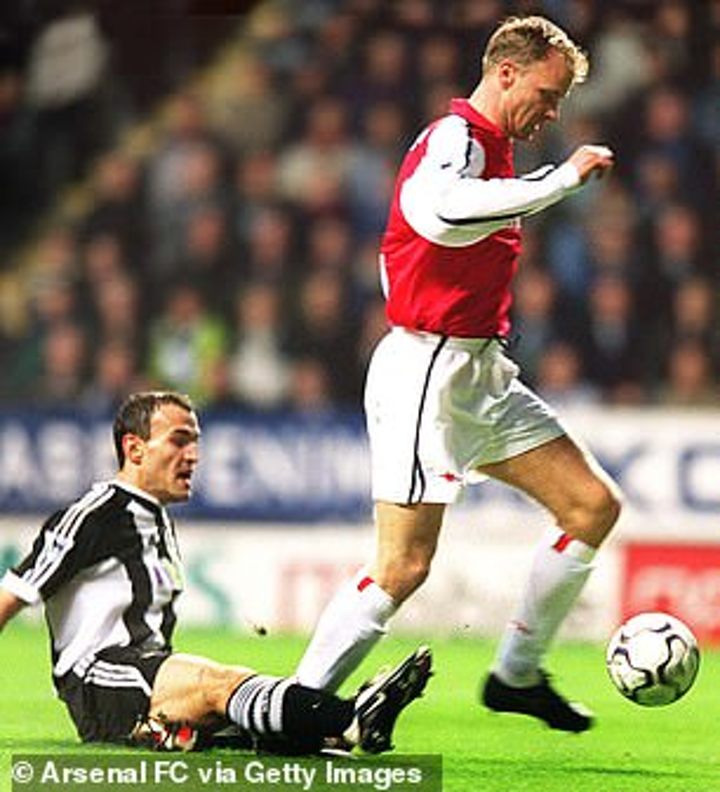
In Bergkamp’s 2013 book Stillness and Speed, one chapter is called Turbulence. It details his infamous fear of flying, and how he decided to stop travelling by air after the 1994 World Cup. ‘It got so bad I would look up at the sky during away games to see what the weather was like,’ remembers Bergkamp from his Inter days.
BERGKAMP: I didn’t know where it came from. It was more of a psychological thing than the fear of flying itself. It really bothered me. A few away games, it really took something out of me. I couldn’t sleep. I was thinking about it all the time. I had to make a decision. People who know me know if I make a decision I stand behind it, 100 per cent, and I won’t go the other way.
Of course I missed a few games I didn’t want to miss. But in the end, I had a career after that which was fantastic and it really helped to get that off my mind. It made me a better player, a better person. So it was a good decision!
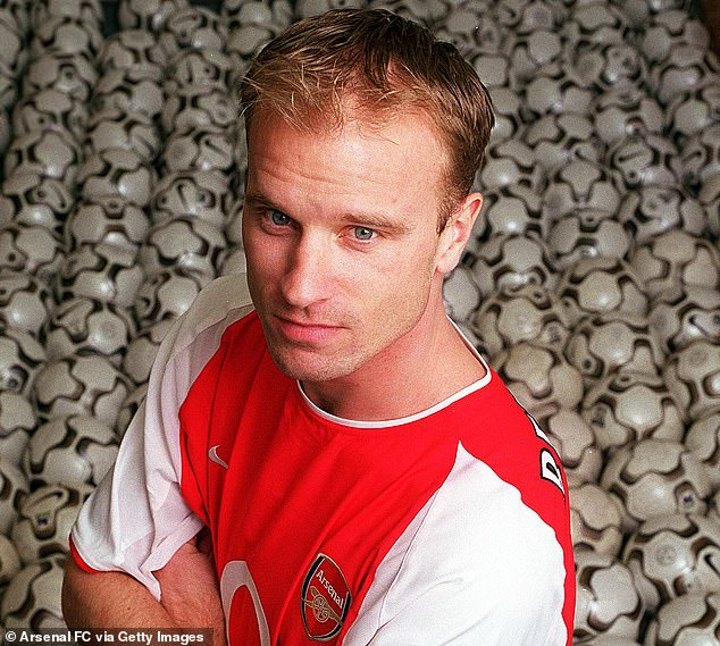
KEOWN: By not flying, you had to do a hell of a lot of extra hours to get from A to B. Newcastle away, for example. We’d fly and land. But you’d still be on the road with Vic Akers (Arsenal’s kit man).
BERGKAMP: Vic loved it! If he says differently then I don’t believe him! I didn’t mind it. It wasn’t any bother. If the boys were flying, I’d go with Vic in the mini van, no problem. I felt better for it.
KEOWN: Was that a problem in 2003 when there were difficulties with your contract extension?
BERGKAMP: No. As soon as I came to Arsenal, we mentioned this, and they never made a problem of it. I felt at home. They understood. They wouldn’t pressure me into doing things I didn’t want to do.
Bergkamp is not one of those footballers whose contribution to the game can be summed up in statistics. But for the record, he scored 122 goals in 237 games for Ajax, 22 in 74 for Inter, and 120 in 423 for Arsenal. The perfect ending would have been to win the 2006 Champions League final, had two late Barcelona goals not condemned Wenger’s 10 men to a 2-1 defeat.
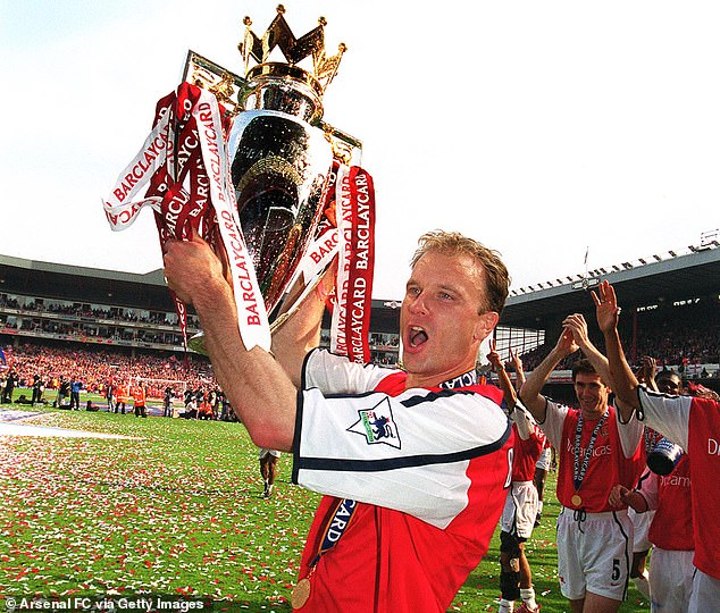
KEOWN: Do you know what it was like for a central defender to play against you, Dennis? So the game starts, I’m thinking: ‘I’ve got Bergkamp, my partner is on Thierry Henry.’ Then you float into midfield. I’m thinking: ‘B******.’ If I go with you, I leave my other centre back with Henry.
BERGKAMP: That was my little battle.
KEOWN: After finishing first or second for eight straight seasons, Arsenal started to come third and fourth. What happened to the team’s balance after 2006?
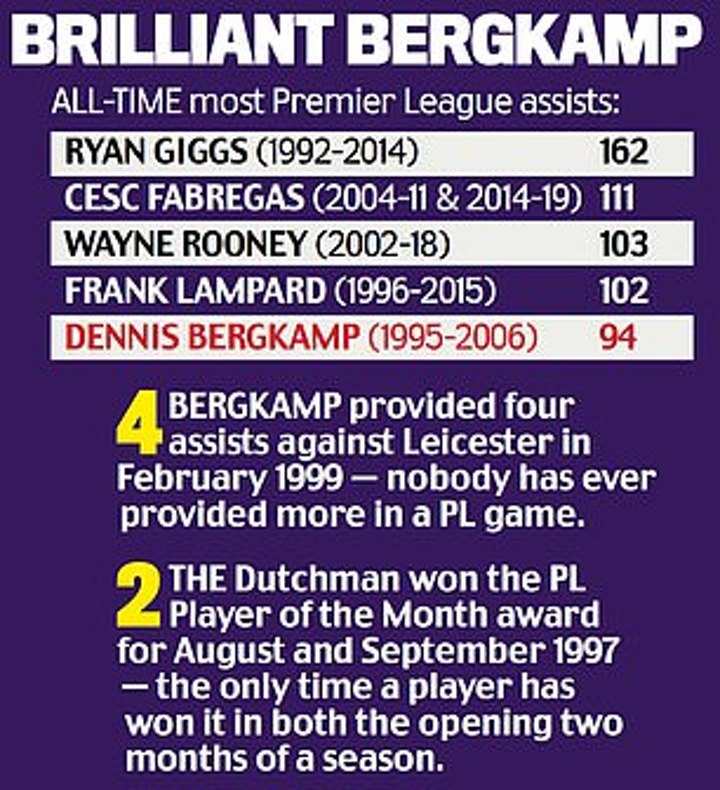
BERGKAMP: Arsene started experimenting.
KEOWN: With five in midfield. Instead of having you there, he had Cesc Fabregas. You would start high then drift into midfield. Then Wenger reversed it. Then the player started deep and went high, as Fabregas did. Many years later, I spoke with a big-name winger at Arsenal. I asked him: ‘Why do you always stay wide?’ Play with freedom. Be instinctive. That’s what the boss wants.
BERGKAMP: Arsenal after 2006, there was too much midfield play. There were no players going into attack, and only one striker who was lonely.
GILL: Is failing to win the Champions League a big regret for you both?
KEOWN: I firmly believe we could have gone on to the latter stages, had we been allowed to play our home games at Highbury rather than Wembley Stadium between 1998 and 2000. One year I remember drawing 1-1 at the Nou Camp, and Wenger had been panicking about how their pitch was 10 metres wider than Highbury! But then we lost 4-2 in the reverse fixture at Wembley.
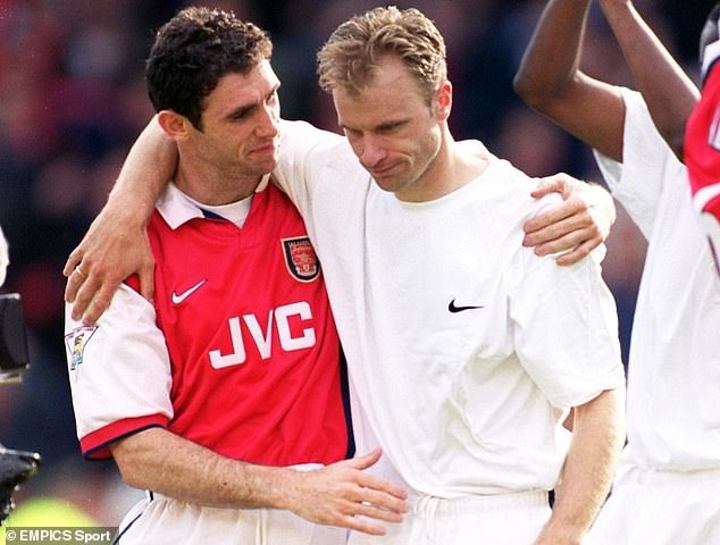
BERGKAMP: For our opponents it was a dream come true to play at Wembley.
KEOWN: Fiorentina’s Gabriel Batistuta was in the tunnel, rubbing his hands: ‘Wembley! Fantastic!’
BERGKAMP: It gave them five per cent more. They were really motivated by it. I don’t think the club was thinking about winning it in those first years. But as we progressed, we thought we had a chance. We got to the final, but couldn’t win it.
Henry called him ‘the master’, Wright called him ‘an architect of space’, and Bergkamp would do Bergkampian things in training, too. ‘You scored a goal once,’ recalls Keown. ‘It was like Marco van Basten against England. Everyone had to stop and applaud.’
Johan Cruyff handed him his Ajax debut at 17 and the Dutch press later described Bergkamp as a ‘schaduwspits’, or ‘shadow striker’. He learned from Cruyff, and also from Wenger, so what does he make of Arteta?
BERGKAMP: I watched Arteta’s first game in charge at home (against Chelsea). In that game it was clear to see what his intentions were with the team. The front four would chase the ball and put pressure on the opponents, but the midfield stayed behind.
There was a big hole. I don’t know if you remember the AC Milan of Arrigo Sacchi, with Marco van Basten, Ruud Gullit and Frank Rijkaard. In training, they’d have ropes between them, so the distance between the players was always similar on the pitch. That was fantastic in our team as well. There was always a connection. There were no holes.
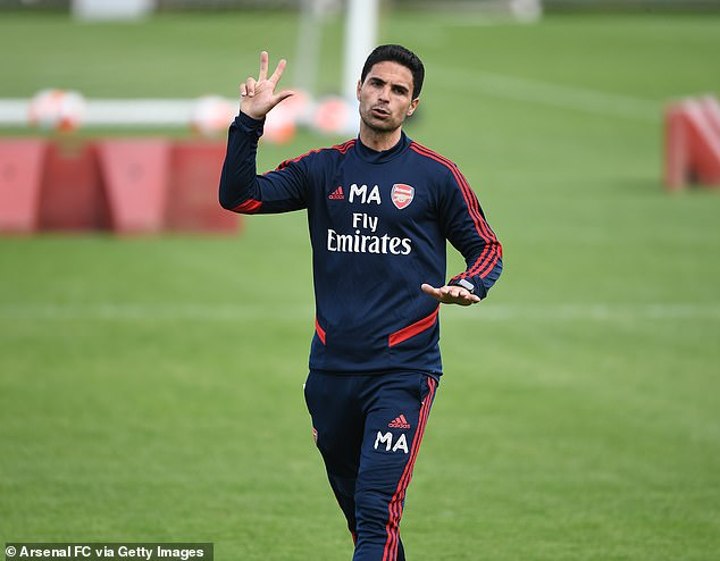
KEOWN: Something for Arteta to work on?
BERGKAMP: He’s working on it, but it needs time and maybe different players. Slowly you can see them trying to play a possession game. Everyone on the ball has three options, triangles on the pitch. It’s much better than before. But it’s a different culture which will take time. You have to put the hours in, like how we did with Arsene.
What’s next for this iconic defence splitter? He was part of a consortium interested in buying League One Wycombe Wanderers but that deal fell through. ‘That’s a shame,’ says Keown. ‘Wycombe is only 25 minutes from me!’
In 2008, Bergkamp took a job at Ajax, where he nurtured the likes of Donny van de Beek and Matthijs de Ligt, before a 2017 clear-out saw the Dutchman dismissed. But he is not done with football.
BERGKAMP: I wanted to be the connection between the youth and the first team. We were on the right track but sadly that was finished abruptly and in a bad way. But you know how football is. You move on. My next step would be to go back on the pitch.
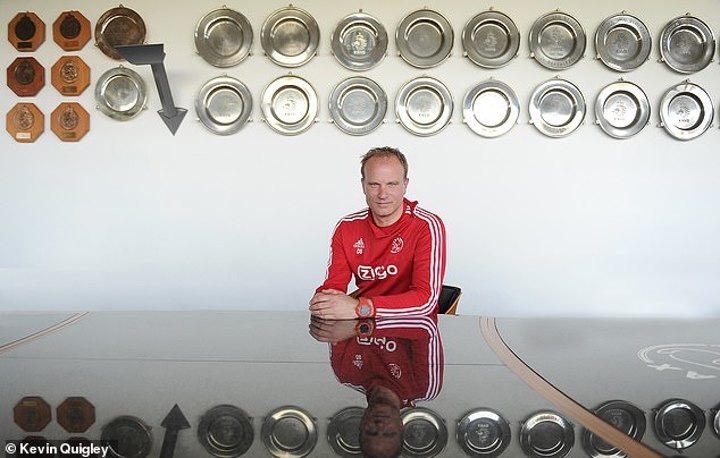
KEOWN: Do you miss that?
BERGKAMP: I do. Ajax is a finished chapter. I’d like to move on and see what happens. Maybe to work with youngsters, bring them to the first team, probably abroad, maybe in England.
KEOWN: I’d like to see you back. Football is a better place with you in it.
SOURCE:- allfootballapp
Now Playing: Love Bug
Aretti Adi
SPONSORED LINKS
LOAN FOR TRAVEL, VISA, JAPA, PoF UP TO N200M (CLICK HERE)
[CLICK HERE] For Music Artwork, Website Design And SEO Setup
INSTALL 9JAFLAVER MUSIC APP, STREAM, DOWNLOAD, AND PLAY MUSIC OFFLINE
CHECK OUT FUNNY PICTURE AND MEME HERE (CLICK HERE)
Chissom Anthony – Glory To God In The Highest [See Trending Gospel Song]
Copyright © 2014-2026 9jaflaver. All Rights Reserved.
About us | DMCA | Privacy Policy | Contact us
| Advertise| Request For Music | Terms Of Service
9jaflaver is not responsible for the content of external sites.